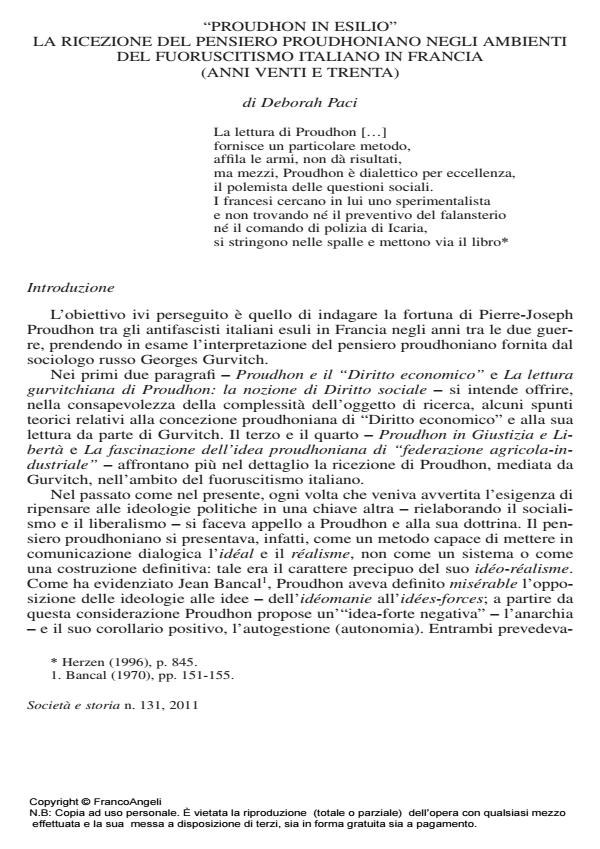"Proudhon in exile". The influence of Proudhon’s thought on Fuorusciti Italian in France (1920’s and 1930’s)
Journal title SOCIETÀ E STORIA
Author/s Deborah Paci
Publishing Year 2011 Issue 2011/131
Language Italian Pages 28 P. 104-131 File size 716 KB
DOI 10.3280/SS2011-001004
DOI is like a bar code for intellectual property: to have more infomation
click here
Below, you can see the article first page
If you want to buy this article in PDF format, you can do it, following the instructions to buy download credits

FrancoAngeli is member of Publishers International Linking Association, Inc (PILA), a not-for-profit association which run the CrossRef service enabling links to and from online scholarly content.
The author analyses the success of Pierre-Joseph Proudhon among other exiled Italian anti-Fascists in France between the two world wars, by considering the interpretation of Proudhon’s thought by Russian sociologist Georges Gurvitch. It was due to Gurvitch if Italian anti-Fascists - Fuorusciti - like Andrea Caffi and Silvio Trentin - Proudhonian theories of "Economic Law" were accepted. Gurvitch’s notion of "Social Law" (reworking of proudhonian "Economic Law") is seen as the only normative principle that equally governs society making a condition of balance in conflict . "Social Law" has had a great influence on anti-Totalitarian culture that has moved in the Giellisti circles. The author explains the various insights expressed by Fuorusciti inquiring about their writings tracing theoretical references in Proudhonian texts and L’Idée du Droit social by Gurvitch.
Keywords: Pierre-Joseph Proudhon, Georges Gurvitch, sociology of law, social law, Italian Fuorusciti, federalism
- Vittorio Giorgini Spatiology–Morphology Architect Denise Ulivieri, Lucia Giorgetti, Benedetta Tognetti, in Nexus Network Journal /2020 pp.191
DOI: 10.1007/s00004-019-00453-4
Deborah Paci, "Proudhon in esilio". La ricezione del pensiero proudhoniano negli ambienti del fuoruscitismo italiano in Francia (anni venti e trenta) in "SOCIETÀ E STORIA " 131/2011, pp 104-131, DOI: 10.3280/SS2011-001004